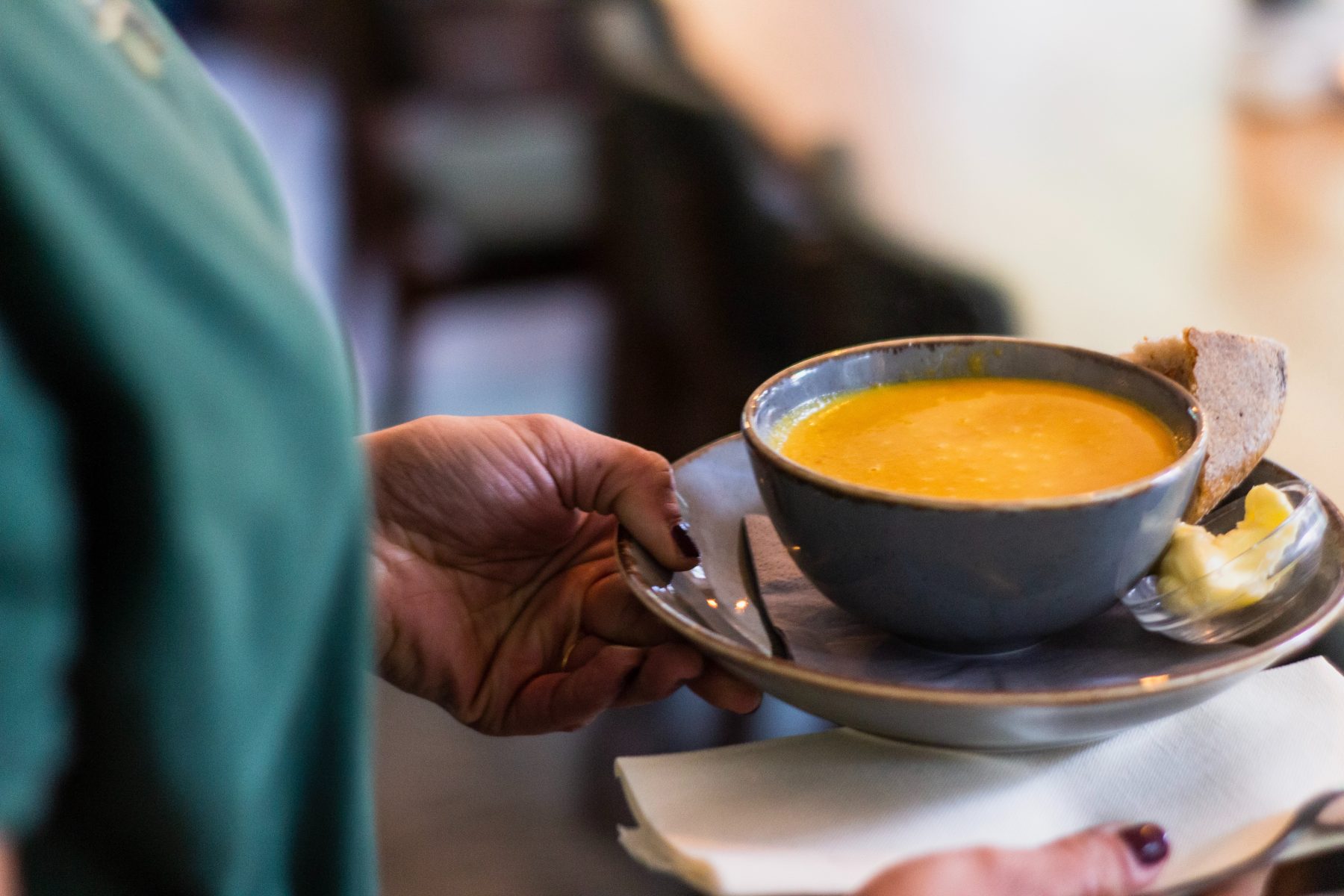A few months ago, I received a gift in the mail. The gift was a book about everyday home caregiving. The book was first published in 1997 for twelve dollars. Now it only cost one dollar from a thrift store. I imagined whose hands this book was held in before mine—sharing a hope, in the most basic of ways, to support caregiving at home.
Laurel’s Kitchen Caring: Recipes for Everyday Home Caregiving was written by Laurel Robertson, a writer and cook who has written many cookbooks. The co-authors, Carol Lee Flinders and Brian Ruppenthal, are Registered Dieticians. Each author had experience with being a caregiver, a friend to a caregiver, or a patient themselves. The book is divided into 6 chapters. There are 154 pages with recipes. Included are caregiving tips that range from mouth care to mealtime suggestions. There are also a range of simple recipes, from thin soups, smoothies, and applesauces, to aspics, puddings, crisps, teas, broths, and casseroles.
The following are a few tips from this book. I hope to share that we can use the care of cooking to support those we care for, and ourselves as caregivers. This can be in simple and supportive ways. The first tip is to be yourself, be open, be calm, and be flexible when it comes to caregiving.
The person(s) we are caring for may be having a hard time, and their frustration can be directed toward you as their caregiver.
Caregiving can be very challenging. There may be a lot of adjustments to make. There may be many new things to learn. There may not be enough hours in your day. The person(s) we are caring for may be having a hard time, and their frustration can be directed toward you as their caregiver. One message from the book offers reassurance: As a caregiver there is a way we can find stability amongst the uncertainty of our role.
Laurel writes:
“Your healthcare providers went to school, worked hard, and got degrees and certificates because they knew they wanted to help sick people. You and I find ourselves in caregiving roles seemingly by accident . . . Safe to say, it’s never easy. There is your lack of experience—you aren’t sure what to do. You feel anxiety about [the person in your care], and there are other pressures, too. No professional can have what you offer. Your personalized, loving care helps the healing process in so many ways. It can help you too. Let it teach you to slow down, to focus, to know what is really important.” (page 15, “From Laurel”)
The recipes in this book are quick, easy, and inexpensive. They are a reminder that your aim is what counts. Even if you do not consider yourself a “cook,” there are simple things you can do to offer comfort. Consider making a simple potato soup (see recipe below).
Nourishment is needed to heal and for health. Illness itself can range from being sick and in the hospital, to managing chronic illnesses. Other challenges may be changes in the ability to shop and prepare meals. Changes in taste or smell may influence appetite. There may be difficulty accessing the types of food that are desired or needed. Learning to accommodate special diets or equipment to eat and drink may require more support. At the end of life, very small amounts of foods may be offered to ease symptoms of a dry mouth and sustain a bond.
“‘Comfort food’ is more than nourishment; food is part of it, maybe the vehicle, so to say, for something else that is mysteriously, powerfully healing. Ask yourself: what is comfort food to you?” (page 22, “From Laurel”)
As caregivers, bringing a home-cooked, simple meal, snack, or beverage to the person can make a positive difference in their healing. A sense of comfort can be created simply. Consider giving a food gift, preparing a place setting that is pleasant, and being present at a meal (even if you didn’t cook it).
In summary, this book is a reminder of the healing power of the cook and the kitchen as caregiver.
If you are a caregiver in need of support or are having trouble accessing food security, LifePath may be able to help. Please contact LifePath at 413-773-5555 or info@LifePathMA.org.
Please reach out to me, Raeann, at rgleblan@umass.edu with any questions, comments, or suggestions. I invite you to create our own catalog of recipes and caregiving tips to support the caregiver and the people in your care, together. If you would like to contribute a caregiving tip or recipe and be part of a community project, please complete this form.
Caregiving Tip 1: Mouth Care
Keep lips and mouth moist. Rinses such as a simple ¼ teaspoon salt mixed with warm water to swish and spit out can help. Soft foods and yogurt with active cultures can promote beneficial oral flora. In cases of mouth pain, soft, cooked, and cool foods and drinks are best.
Caregiving Tip 2
Offer opportunities for the person who you are caring with to have control, options, and choices.
Recipe from Laurel’s Kitchen Caring: Recipes for Everyday Home Caregiving
Simple Potato Soup
Ingredients:
- 4 large potatoes
- 1 onion
- 2 garlic cloves
- 1 tablespoon olive oil
- 4 cups of hot milk or broth or soy milk
- 1 teaspoon salt and pepper
- Chopped parsley (optional)
Directions:
- Wash and peel potatoes, cut in quarters, and boil until tender.
- Remove from heat and set aside.
- Sauté onion and garlic in oil.
- Mash part or all of the potato and stir all into the other ingredients, adding the salt and pepper.
- Serve with chopped parsley on top.
Cost: About $3.00/75 cents per serving
Tailor the recipe
- No fat: Simmer potatoes with garlic and onion in water instead of sauteing in oil.
- More calories: Increase the oil for sauteing; use whole milk; stir in sour cream or butter.
- Increase calcium or protein: Blend in ½ cup milk powder.





